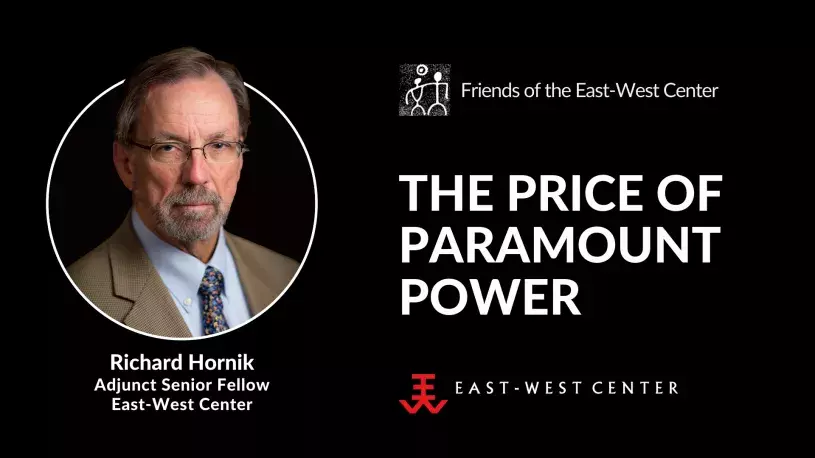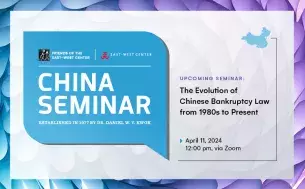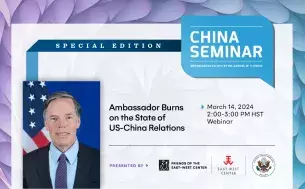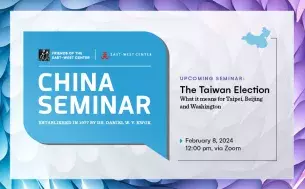Error message

OFFICE/DEPARTMENT
The Price of Paramount Power: Xi Jinping’s position as China's most powerful leader since Mao comes with costs
featuring
Richard Hornik
Adjunct Senior Fellow, East-West Center
The recent Communist Party Central Committee plenum marked the Party’s 100th anniversary by declaring the start of a new era through the elevation of Xi Jinping’s status to that of a seminal leader on a par with Mao Zedong and even above Deng Xiaoping. The accompanying propaganda onslaught has further deepened and broadened the Xi personality cult, while his political machinations seem to have sidelined all possible competitors.
But a leader with supreme power and much-advertised omniscience can find it difficult to deflect responsibility or reverse course when his policies fail. Xi is facing intractable problems – some of his own making – that he will find difficult to address in the yearlong run-up to next year’s Party Congress. How he handles these issues will mark a turning point in China’s crusade, as the Plenum promised, to continue its “…great leap from standing up, getting rich to becoming strong, and realizing the great rejuvenation of the Chinese nation.”
Richard Hornik is an Adjunct Senior Fellow at the East-West Center. During his 30-year career in journalism, he served as executive editor of AsiaWeek, News Service director of Time Magazine, and Time’s bureau chief in Warsaw, Boston, Beijing and Hong Kong. He co-authored Massacre in Beijing: China’s Struggle for Democracy, and has written for Foreign Affairs, Fortune, the Harvard Business Review, Smithsonian, The New York Times and Wall Street Journal. He has an M.A. in Russian Studies from George Washington University and a B.A. in political science from Brown University. He was a Lecturer at Stony Brook University from 2007-19 and was a Visiting Lecturer at Hong Kong in 2012 and at the University of Hawaiʻi at Mānoa in 2015. He is a member of the Council on Foreign Relations.
The China Seminar was founded by Dr. Daniel W.Y. Kwok 44 years ago. Under his guidance, it became a signature program of the Friends of the East-West Center (FEWC) in 2009. The program provides an informal venue for China experts, such as scholars, diplomats, and journalists, to present talks on aspects of China that interest the community and members of the Friends. Topics include politics, economics, social issues, history, culture, food, arts, and many other subjects. Though Dr. Kwok has recently retired from his involvement with the program, the FEWC and the East-West Center remain committed to continuing this important program.
The Price of Paramount Power: Xi Jinping’s position as China's most powerful leader since Mao comes with costs
featuring
Richard Hornik
Adjunct Senior Fellow, East-West Center
The recent Communist Party Central Committee plenum marked the Party’s 100th anniversary by declaring the start of a new era through the elevation of Xi Jinping’s status to that of a seminal leader on a par with Mao Zedong and even above Deng Xiaoping. The accompanying propaganda onslaught has further deepened and broadened the Xi personality cult, while his political machinations seem to have sidelined all possible competitors.
But a leader with supreme power and much-advertised omniscience can find it difficult to deflect responsibility or reverse course when his policies fail. Xi is facing intractable problems – some of his own making – that he will find difficult to address in the yearlong run-up to next year’s Party Congress. How he handles these issues will mark a turning point in China’s crusade, as the Plenum promised, to continue its “…great leap from standing up, getting rich to becoming strong, and realizing the great rejuvenation of the Chinese nation.”
Richard Hornik is an Adjunct Senior Fellow at the East-West Center. During his 30-year career in journalism, he served as executive editor of AsiaWeek, News Service director of Time Magazine, and Time’s bureau chief in Warsaw, Boston, Beijing and Hong Kong. He co-authored Massacre in Beijing: China’s Struggle for Democracy, and has written for Foreign Affairs, Fortune, the Harvard Business Review, Smithsonian, The New York Times and Wall Street Journal. He has an M.A. in Russian Studies from George Washington University and a B.A. in political science from Brown University. He was a Lecturer at Stony Brook University from 2007-19 and was a Visiting Lecturer at Hong Kong in 2012 and at the University of Hawaiʻi at Mānoa in 2015. He is a member of the Council on Foreign Relations.
The China Seminar was founded by Dr. Daniel W.Y. Kwok 44 years ago. Under his guidance, it became a signature program of the Friends of the East-West Center (FEWC) in 2009. The program provides an informal venue for China experts, such as scholars, diplomats, and journalists, to present talks on aspects of China that interest the community and members of the Friends. Topics include politics, economics, social issues, history, culture, food, arts, and many other subjects. Though Dr. Kwok has recently retired from his involvement with the program, the FEWC and the East-West Center remain committed to continuing this important program.
China Seminars
The China Seminar was established by Dr. Daniel W.Y. Kwok in 1977. Under his guidance, it became a signature program of the Friends of the East-West Center (FEWC) in 2009. The program provides an informal venue for China experts, such as scholars, diplomats, and journalists, to present talks on aspects of China that interest the community and members of the Friends.









